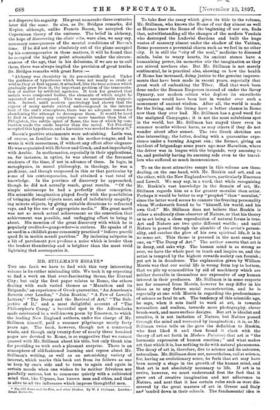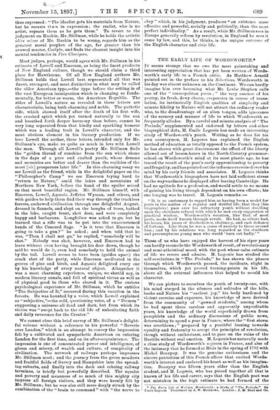MR. STILLMAN'S ESSAYS.*
THE one fault we have to find with this very interesting volume is its rather misleading title. We took it up expecting to find a work on that ever-fascinating theme, the Eternal City ; but only the first paper relates to Rome, the others dealing with such varied themes as "Marathon and its Brigands," an experience of Greek quarantine, "An American's Reverie over London," "John Ruskin," "A Few of Lowell's Letters," "The Decay and the Revival of Art," "The Sub- jective of It," and a most delightful account of "The Philosopher's Camp," a beautiful spot in the Adirondacke made celebrated in a well-known poem by Emerson, to which the leading New England authors, under the charge of Mr. Stillman himself, paid a summer pilgrimage nearly forty years ago. The book, however, though not a connected whole, and though only twenty-four of nearly three hundred pages are devoted to Rome, is so suggestive that we cannot quarrel with Mr. Stillman about his title, but only thank him for providing us with such a pleasant surprise. There is an atmosphere of old-fashioned learning and repose about Mr. Stillman's writing, as well as an astonishing variety of interest, which marks this book out from its fellows as one to keep by one's side and to turn to again and again in certain moods when one wishes to be neither frivolous nor painfully serious, but to commune quietly with a cultivated mind that, like Ulysses, has known men and cities, and that is alive to all tbe influences which impress thoughtful men.
• The 014 Rome and the New, and other Studies. By W. J. Stillman. London : limit Richards.
To take first the essay which gives its title to the volume, Mr. Stillman, who knows the Rome of our day almost as well as Horace knew the Rome of the beginning of our era, finds that, notwithstanding all the changes of the modern Vandals who destroyed the Ludovisi Gardens and built the huge wastes of masonry almost under the shadow of the Vatican, Rome possesses a perennial charm such as we feel in no other city. It is still the "city of the soul," medicine to diseased minds, balm to weary hearts, its ancient stones have a humanising power, its memories stir the imagination as they are stirred nowhere else. But Mr. Stillman is not merely sentimental, he is practical also, showing us how the health of Rome has increased, doing justice to the genuine improve- ments that have been made in recent years, especially that great work of embanking the Tiber. Had that work been done under the Roman Emperors instead of under the Savoy Dynasty, our modern critics who deplore its anesthetic appearance would have been lost in wonder over such a monument of ancient wisdom. After all, the world is made for the living, and the living have a better chance in Rome now than they ever had. Mr. Stillman has a good word for the maligned Campagna ; it is not the most salubrious spot in the world, but Mr. Stillman has stayed there even in summer months without harm, as may others if they do not wander about after sunset. The two Greek sketches are also interesting; the latter, dealing with a quarantine expe- rience under a burning August sun ; the former, giving an incident of brigandage some years ago near Marathon, where the driver was in league with the brigands, very amusing to us, and probably having its amusing side even to the travel- lers who suffered so much inconvenience.
To us the most attractive essays in this volume are those dealing, on the one hand, with Mr. Ruskin and art, and on the other, with the New England writers, particularly Emerson and Lowell. We may say, in a word, that while recognising Mr. Ruskin's vast knowledge in the domain of art, Mr. Stillman regards him as a far greater moralist than artist. Perhaps it would be better to say " prophet " than" moralist," since the latter word seems to connote the freezing personality whom Wordsworth found to be "himself, his world, and his own God." Mr. Stillman does not believe that Ruskin is either a studiously close observer of Nature, or that his theory as to art being a close reproduction of natural forms is true. Art and Nature are two quite different worlds ; and until Nature is passed through the alembic of the artist's person- ality, and catches the glow of his own spiritual life, it is in no sense art. This theme is pursued in the next essay but one, on "The Decay of Art." The author asserts that art is in decay, and asks why. The human mind is as strong as ever, we have the whole past to teach and inspire us, and the artist is tempted by the highest rewards society can furnish ; yet art is in decadence. The explanation given by William Morris was that our social life is wrong from top to bottom, that we pile up commodities by aid of machinery which are neither desirable in themselves nor expressive of any human interest in their producers. Mr. Stillman is in some respects not far removed from Morris, however he may differ in his ideas as to any future social reconstruction, and he is especially at one with Morris in regarding the predominance of science as fatal to art. The tendency of this scientific age, he says, when it sets itself to work at art, is towards naturalism and realism, towards mere photography, clever brush-work, and mere surface designs. But art is idealist and creative, it is not imitation of Nature, but Nature passed through the mind and recreated by imagination ; it is, as Mr. Stillman twice tells us (he gave the definition to Ruskin, who first liked it and then found it clash with the theory of art set forth in Modern Painters) that art is "the harmonic expression of human emotion;" and what makes art that which it is, has nothing to do with natural phenomena. The decay of art is, therefore, due to science and its outcome, naturalism. Mr. Stillman does not, nevertheless, rail at science, for, having an evolutionary sense, he feels that art may have been merely a stage in the growth of the human mind, and that art is not absolutely necessary to life. If art is to revive, however, we must understand first the fact that it grew out of creative imagination and not adherence to Nature, and next that it has certain rules such as were dis- covered by the great masters of art in Greece and Italy and 'landed down in their schools. The fundamental idea is
thus expressed : "The idealist gets his materials from Nature, but he recasts a en in expression ; the realist, who is no artist, repeats them as he gets them." To revert to the judgment on Ruskin, Mr. Stillman, while he holds the artistic idees meres of Mr. Ruskin to be wrong, regards him as the greatest moral prophet of the age, far greater than his avowed master, Carlyle, and finds the clearest insight into his mental tendencies in Fors Clavigera.
Most judges, perhaps, would agree with Mr. Stillman in his estimate of Lowell and Emerson, as being the finest products of New England culture, though we should claim a third place for Hawthorne. Of all New England authors Mr. Stillman holds that Lowell best represented all that was finest, strongest, and most distinctive in what may be called the older American type,—the type before the setting in of the vast European immigration which is changing so funda- mentally, for better or worse, the American Republic. The sides of Lowell's nature as revealed in these letters are characteristic, being both charming and noble. The pathetic side, which showed itself after the death of his first wife, the crushed spirit which yet turned naturally to the sun and breathed forth deeper harmony than before, cannot be very long separated from that kindly and sparkling humour which was a leading trait in Lowell's character, and the most obvious element in his literary production. If we love Lowell the author, these letters, intended only for Mr. Stillman's eye, make us quite as much in love with Lowell the man. Through all Lowell's poetry Mr. Stillman finds the "golden thread of sunshine from the sun which shone in the days of a pure and exalted youth, whose dreams and memories are better and dearer than the realities of the most [sic] prosperous later life." In this charming essay we see Lowell as the friend, while in the delightful paper on the "Philosopher's Camp" we see Emerson trying hard to "return to Nature," amid the lakes and mountains of Northern New York, before the hand of the spoiler seized on that most beautiful region. Mr. Stillman himself, with Emerson, Lowell, Agassiz, Jeffries Wyman, and others, and with guides to help them find their way through the trackless forests, eschewed civilisation through one delightful August, dressed in flannels, and slept on the boughs of trees, bathed in the lake, caught trout, shot deer, and were completely happy and barbarous. Longfellow was asked to go, but he learned that a rifle was to be put into the unaccustomed hands of the Concord Sage. "Is it true that Emerson is going to take a gun ?" he asked ; and when told that he was, "Then I shall not go," he replied, "somebody will be shot." Nobody was shot, however, and Emerson had to leave without even having brought his deer down, though he said he would do it, even had somebody to hold the animal by the tail. Lowell seems to have been (guides apart) the crack shot of the party, while Emerson meditated in the groves of pine and birch, and Agaesiz delighted every one by his knowledge of every natural object. Altogether it was a most charming experience, unique, we should say, in modern literary annals, and full of spiritual virtue as well as of physical good to those who shared in it. The curious psychological experience of Mr. Stillman, which he entitles "The Subjective of It," occurred during this vacation in the forests. He was haunted by a voice, which Lowell explained as "subjective,"—the cold, questioning voice, of a "Demon" suggesting a universe all dead and dark, but from which its victim was "swept back to the old life of unhesitating faith and daily reverence for the Creator."
We cannot close this brief survey of Mr. Stillman's delight- ful volume without a reference to his powerful "Reverie over London," which is an attempt to convey the impression felt by a cultivated and sympathetic American on entering London for the first time, and on its after-acquaintance. The impression is one of concentrated power and intelligence, of gloom and misery, of wealth and culture, of complexity of civilisation. The network of railways perhaps impresses Mr. Stillman most; and the journey from the green meadows and fruitful fields of Surrey and Hampshire into the spread- ing suburbs, and finally into the dark and echoing railway terminus, is briefly but powerfully described. The squalor and poverty and meanness of so much of this mighty city impress all foreign visitors, and they were keenly felt by Mr. Stillman; but he was also still more deeply struck by the combination of the "brain to command" with "the nerve to
obey" which, in his judgment, produces "an existence more effective and powerful, socially and politically, than the most perfect individuality." As a result, while Mr. Stillman sees in Europe generally reform by revolution, in England he sees it come by law, and this, he thinks, is the unique outcome of the English character and civic life.







































 Previous page
Previous page